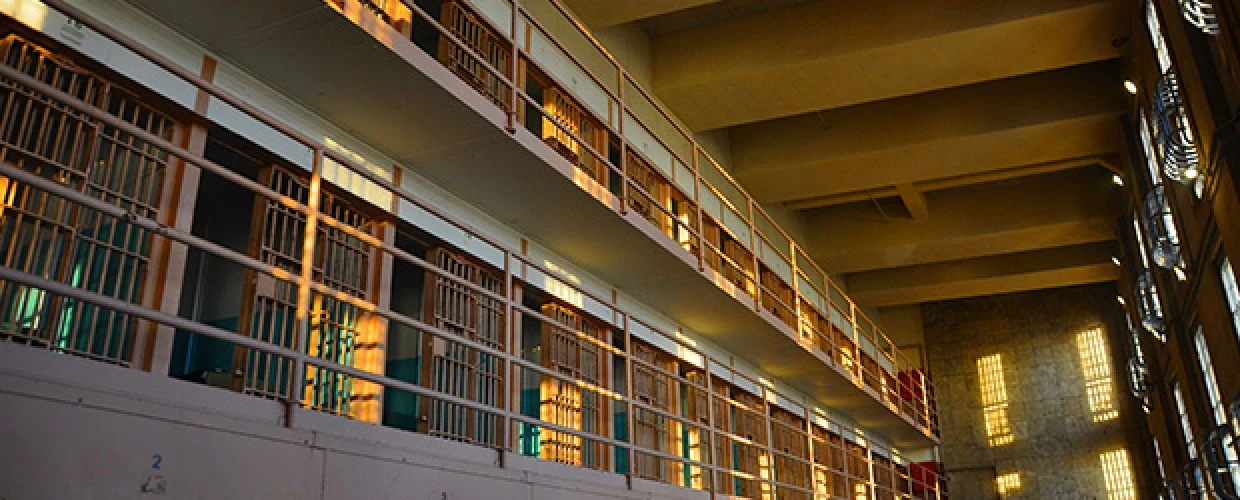The question, “Do prisons have air conditioning?” isn’t something that the public would typically ask, but it’s an important topic for those interested in criminology and the criminal justice system to consider. The treatment of prisoners is paramount, as it affects multiple, diverse aspects of incarceration.
There is currently no federal requirement for temperatures inside of state jails and prisons.1 While some prisons have air conditioning, many do not, especially at the state level. For now, the power to use air conditioning in state correctional institutions remains with the states and with individual facilities.
While air conditioning is practically universal in southern states, with 95% of households using it, many states in the south refuse to install AC in their prisons. Although there are no national statistics, at least 13 of the hottest states in the country lack universal air conditioning in their prisons. This creates dangerous, potentially lethal conditions for those who are incarcerated, as well as the guards and other staff who attend to them.1
Read on to consider what can happen when the answer to, “Do prisons have air conditioning?” is a resounding, deadly, “No.”
Do prisons have air conditioning? Why is that important?
Regular exposure to extreme heat can cause serious illness, and the incarcerated population is especially vulnerable due to health conditions, overcrowding, building materials and lack of options for cooling down. Prolonged extreme heat exposure can cause dehydration and heat stroke, both of which can be fatal. Extreme heat can also affect the liver, kidneys, heart, lungs and brain, and can cause heart attack, stroke and renal failure.1
People who are incarcerated are subjected to heat-related risks from multiple sources:
Many prisoners take medications for high blood pressure, or psychotropic medications such as Prozac or Zoloft, which can have adverse effects in extreme heat. Certain health conditions can also make them more susceptible to heat-related illness. Older individuals are at greater risk of heart disease, and heat exacerbates cardiovascular and respiratory illnesses such as asthma.1
The materials used to build prison facilities retain heat. This increases temperatures within prison buildings, often to the point of exceeding outdoor temperatures.1
Among the freedoms denied to those in the prison system is that of adjusting one’s own environment. A 2018 article in Prison Legal News noted, “People outside of prison who experience extreme heat have options that prisoners often lack—they can take a cool shower, drink cold water, move into the shade or go to a place that is air conditioned. For prisoners, those options are generally unavailable.” Even something as basic as a fan can be inaccessible. Despite the fact, for example, that prisoners in Texas are not paid for their labor, the Texas prison commissary charges $20 for a fan.1
A 2015 study concerning heat in American jails and prisons found that rising temperatures and severe heat waves caused by climate change, along with chronic prison overcrowding, would greatly increase the risk factors for heat-related illness among inmates. The study stated that excessive temperatures in prison cells may constitute cruel and unusual punishment under Federal law.2
Do prisons have air conditioning? Not in some states.
The following states do not provide universal air conditioning to all their prisons: Alabama, Arizona, Florida, Georgia, Kansas, Kentucky, Louisiana, Mississippi, Missouri, North Carolina, South Carolina, Texas and Virginia.1 Due to climate change, however, more states are in danger of seeing excessively high temperatures during abnormal heat waves.
According to a 2019 study by the peer-reviewed journal Environmental Research Communications, the number of days annually with heat indices higher than 100°F could double or even triple by 2050.3 This makes the issue of air conditioning in state jails and prisons even more critical.
Extreme Heat and Legal Action
Excessive heat with no air conditioning regularly leads to fatal conditions in prisons. The Marshall Project, a nonprofit organization that reports on criminal justice issues, states that there are no national statistics on the number of inmate deaths due to extreme heat, although there are many local accounts of state prisons overheating in the summer.4
Texas
- A 2014 report found that the summer heat index inside Texas Department of Criminal Justice (TDCJ) facilities could exceed 149°F5
- In 2018, 19 incarcerated people and prison staff in Texas were treated for heat-related illnesses1
- In 2018, more than 70% of Texas’ 141,000 state prisoners were held in jails and prisons that lacked air conditioning. At that time, only 30 of the 105 Texas Department of Criminal Justice (TDCJ) facilities were fully air conditioned.1 As of August 2021, there were 99 TDCJ facilities, of which only 30 were air conditioned throughout6
- Between 2011 and 2021, at least 13 people died of heat stroke in Texas prisons7
- Legislation taken up in Texas in 2021 to require air conditioning for the state’s correctional facilities did not pass; cost was cited as the reason. Meanwhile, the state has incurred legal fees to fight 17 lawsuits relating to excessive heat in its prisons7
- Prison officials in Texas stated that the costs of retrofitting would be prohibitive. Administrative areas, however, are air conditioned with portable window units1
Louisiana
In 2016, the state of Louisiana paid more than $1 million in legal fees to avoid having to install air conditioning on death row. According to a witness, this was four times the cost of installing the AC.8
Kansas
Several Kansas state prisons (state prison officials declined to clarify how many) lack universal air conditioning. From June through September 2021, there were 36 heat-related incidents in the state’s eight facilities.9
Iowa
In July 2021, record heat and high humidity in Iowa led to a heat index well above 100°F. Housing units in at least two of the state’s prisons lack air conditioning. Inmates are often restricted to their cells. In a letter to a loved one, one inmate wrote, “You may not be aware of how warm it can get in a building with 300+ prisoners and staff – but it gets hot. More and more are getting headaches and having breathing problems due to the quality of the air. A majority of us are still in the cellhouse most of the day – except for an hour and a half – weather permitting – to go to the yard.”10
Pennsylvania
In the summer of 2019, 1,000 inmates in the Philadelphia Detention Center, which is the city jail, were subjected to a weekend-long 100°F heat emergency without air conditioning. While the state law requires heating in Pennsylvania’s correctional facilities, there is no similar requirement for cooling.11
Florida
During a 2021 protest highlighting the lack of air conditioning in most Florida prisons, it was revealed that just 23% of that state’s correctional institutions had air conditioning.12
A 2020 study found a correlation between excessive heat in prisons and a rise in inmate violence. In Mississippi prisons, it was found that on days where the average temperature was at least 80°F, the chance of violent behavior increased by 20%. Hot weather led to 44 additional incidents of severe violence annually.13
Courts in Mississippi, Wisconsin and Arizona have ruled that keeping prisoners in extremely hot (or cold) temperatures violates the Eighth Amendment. These cases have not, however, led to a national policy on air conditioning in state prisons.1
Do prisons have air conditioning? You can change the answer.
With the right credentials, you’ll have the power to raise public attention to important issues and drive meaningful, lasting change in the American criminal justice system.
Designed for working professionals, Kent State’s online Master of Arts in Criminology and Criminal Justice degree offers concentrations in Policing, Corrections, Victimology, and Global Security. To learn more, talk with one of our Admissions Advisors, and then start your application today.
Sources:
- Retrieved on February 9, 2022, from prisonpolicy.org/blog/2019/06/18/air-conditioning/
- Retrieved on February 9, 2022, from web.law.columbia.edu/sites/default/files/microsites/climate-change/holt_-_heat_in_us_prisons_and_jails.pdf
- Retrieved on February 9, 2022, from iopscience.iop.org/article/10.1088/2515-7620/ab27cf
- Retrieved on February 9, 2022, from themarshallproject.org/2017/10/11/cooking-them-to-death-the-lethal-toll-of-hot-prisons
- Retrieved on February 9, 2022, from law.utexas.edu/wp-content/uploads/sites/11/2015/04/2014-HRC-USA-DeadlyHeat-USShadowReport.pdf
- Retrieved on February 9, 2022, from fastcompany.com/90664656/extreme-heat-is-turning-prisons-into-ovens
- Retrieved on February 9, 2022, from motherjones.com/crime-justice/2021/05/texas-prisons-air-conditioning/
- Retrieved on February 9, 2022, from pressherald.com/2016/06/13/louisiana-spends-1-million-to-fight-air-conditioning-on-death-row/
- Retrieved on February 9, 2022, from lawrencekstimes.com/2021/10/27/temps-ks-prisons/
- Retrieved on February 9, 2022, from iowapublicradio.org/ipr-news/2021-07-28/extreme-heat-a-concern-at-prisons-that-lack-air-conditioning
- Retrieved on February 9, 2022, from inquirer.com/opinion/editorials/climate-change-air-condition-human-right-prison-public-housing-20190725.html
- Retrieved on February 9, 2022, from drive.google.com/file/d/1R_Kdp6a_PuFtnVX4nYr-vjlMOFJS_YMr/view
- Retrieved on February 9, 2022, from economist.com/graphic-detail/2021/07/27/intense-heat-raises-the-risk-of-violence-in-american-prisons




